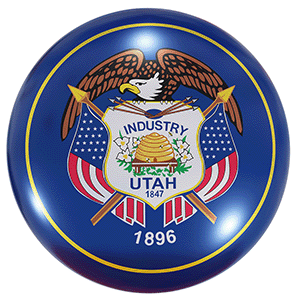Utah Court Records
Utah court records are a valuable resource for anyone looking to research their legal history or gather information on a specific case. With the rise of online databases and search tools, accessing these records has become easier than ever.
In this article, we will discuss how to run a Utah court records search by name orcase number. We will also touch on the different state and county courts in Utah and their functions, and the Utah Courts Xchange. You will also learn what public records can be accessed online.
How to Run a Utah Court Records Search By Name
There are several ways to run a Utah court records search. The most common method is by using an online database or search tool. To begin a Utah court records search by name, you only need the first and last name and not the case number. Then using either the relevant court website, or a public records site, you can quickly track down the information you are after.
These tools allow you to run a UT court records search by name, case number, or other relevant information. Some websites may require a fee for access to their database, while others may offer free searches. It is important to note that not all court records are available online, and some may require a visit to the courthouse in person.
The benefit of using a public records site is you can also access a person’s complete Utah background check. What this means is you can view all their criminal records, convictions, sentencings, arrest records, warrants, judgments, bankruptcies, traffic citations and more. Many people use these resources to find out more about a person’s character and if they are trustworthy.
Utah Court Case Lookup by Case Number
The fastest way to access court case documents is to Utah court case lookup by case number. If you know the specific case number from the specific courthouse, you can quickly locate the records and documents you are looking for. This is typically the fastest way to track down specific case information. If you are uncertain what county or which courthouse the case was heard in, you can always reach out to the Clerk of the Courts for assistance. You can search with the case number either on the UT Xchange website, the relevant courthouse website, or public record sites.
State and County Judicial Branches
Utah, like most states, has a three tiered judicial system. This starts with the Utah Supreme Court at the top. Then followed Court of Appeals, and District Courts.
The Supreme Court is the highest branch of the judicial system, and has jurisdiction over all cases heard in the state. The Appeals division handles appeals from the lower courthouses and certain administrative agencies. The District courthouses are the general trial courts the state. They mostly handle a wide range of cases, including civil, criminal, and family law.
In addition to the state judicial divisions, there are also county courthouses in Utah. These courts handle cases within their respective counties and have limited jurisdiction. These smaller divisions may handle cases such as small claims, traffic violations, and misdemeanors.
Using the Utah Xchange: Public Case Search
The Utah Courts Xchange is an online database that provides access to case records from the state’s entire judicial branch. This database is maintained by the state’s judicial branch and is available to the public for a fee. Users can search for records by name, case number, or other relevant information. The Utah Courts Xchange also offers a subscription service for frequent users. This is a good resource for anyone needing specific case materials including official and certified documents. To use the Xchange you will need to register and sign up with an account to access files, dockets and documents.
The UT Xchange can be used to research an individual’s legal history, gather information on a specific case, or verify the outcome of a criminal or civil case. These records can also be used by employers, landlords, and other organizations to conduct background checks. Additionally, judicial records can provide insight into the legal system and how it operates.
How to Use the Utah Court Calendar
The Utah court calendar is an important tool for the public to stay informed about upcoming hearings and proceedings. It provides a schedule of ongoing sessions, including the date, time, and location of each case. The calendar gives the public a heads-up to know when and where a particular case will be heard.
The calendar also gives interested parties information about upcoming hearings. This helps to make sure there transparency and accountability within the state’s judicial system. The UT court calendar is an important tool that makes an open and accessible judicial process for the public.
Conclusion
Utah judicial system offers many online resources for those that want or gather legal information on a specific case. With the availability of online databases and search tools, accessing these records has become easier than ever. Whether you are conducting a personal search or using this information for professional purposes, access is made publicly available by the Utah Public Records Laws.

Utah Court Records - FAQ
Can I lookup Utah court case records for free?
Yes, you can find a lot of information online for free through public record sites and county courthouse websites. If you use the Utah Court Xchange website you will need need to pay for access.Are Utah court records considered public records?
Yes, these records are generally considered public records and can be accessed by the public, subject to certain exceptions and restrictions. Records that are sealed, juvenile records, and those that concern national security are not available to the general publicCan I run a Utah court case lookup by case number?
Yes, there are a few options to run a UT court case lookup by case number. 1).You can use the Utah Court Xchange site 2).You can lookup case information directly from the relevant courthouse website. 3).You can also use a public record site to access UT court records by case numberHow can I use the Utah Courts Xchange?
To use the Utah Courts Xchange, you need to register and sign up for an account. Once registered, you can search for records by name, case number, or other relevant information.Can I search Utah court records by name?
Yes, you can search Utah court records by name. Many online public record databases and search tools allow you to look up records using a first and last name, or case number.Comments
Leave Reply - See responses below:
Responses to “Utah Court Records”
Last Updated: 2024-02-15
Please be advised that the information accessed through SearchQuarry.com searches may not always be accurate or current, as we neither generate nor authenticate the data provided via our service. The reliability and precision of information are primarily contingent upon diverse public sources from which data is compiled. By utilizing SearchQuarry.com, you acknowledge your acceptance of the terms delineated in the SearchQuarry.com terms of service and our privacy policies. Information acquired via SearchQuarry.com must not be utilized for unlawful purposes such as stalking or harassing individuals, or scrutinizing public figures or celebrities. Individuals who contravene these directives may be subject to both civil and criminal legal proceedings and sanctions. It is explicitly stated that SearchQuarry.com does not function as a "consumer reporting agency" as defined by the Fair Credit Reporting Act ("FCRA"), and therefore, does not furnish "consumer reports" pursuant to the FCRA. SearchQuarry.com strictly prohibits the utilization of information garnered from search results (a) for discriminatory practices against any consumer; (b) for assessing a consumer's eligibility for personal credit, insurance, employment, housing, or government licenses or benefits; or (c) in any other manner that may impact a consumer's economic or financial status or standing.



I would like to know what happened to Richard ross peterson on his court day in manti utah during oct. 2020. this was a dwr. case
Guy, unfortunately we don’t have any information about the person you’ve requested Utah court records on. If this is an ongoing case it will not be public record yet